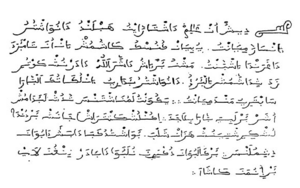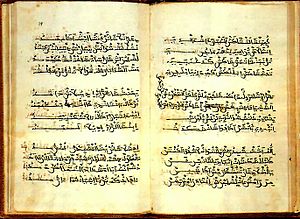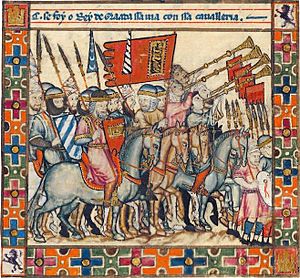Muladí facts for kids
Muladí (pronounced moo-lah-DEE) were people from the Iberian Peninsula (modern-day Spain and Portugal). They were originally Christian but chose to become Muslim after the Muslims arrived in the early 700s.
At first, it was important to tell the difference between Muladi people and those who came from Arab or Berber families. But by the 900s, most people in Al-Andalus (Muslim-ruled Spain) were a mix, and the Muladi became a big part of society. In Sicily, people of local or mixed Arab and Sicilian background who became Muslim were also sometimes called Muwallad. They were also known as 'Islamized' people.
The word muwallad can also describe Arabs of mixed family background, especially if they don't live in their original homelands.
Contents
What Does the Word "Muladi" Mean?
The Spanish, Portuguese, and Catalan words for Muladi come from the Arabic word muwallad. This word generally means 'a person of mixed family background'. It often refers to someone with one Arab parent and one non-Arab parent. This person would have grown up in an Arab society and learned about Islamic culture.
The Spanish word Muladi comes from muwalladun. This term was used for Arabic-speaking Muslims of Hispanic origin. They sometimes acted like Arab and Berber rebels who fought against Arab rule. An example is during the Great Berber Revolt in the 700s.
The word Muwallad comes from walad, which means 'descendant' or 'child'. Muwallad was used for children of Muslim fathers and non-Muslim mothers. Even today, the term muwalladin is sometimes used in Arabic for children of Muslim fathers and foreign mothers.
Some experts say Muwallad means "anyone who was not born Muslim but grew up among Muslims and was raised like an Arab." This word doesn't always mean someone has Arab parents.
The dictionary of the Real Academia Española says muladí means "a Christian who converted to Islam during Arab rule in Spain and lived among Muslims." The word muladí might also be one of the origins for the word mulato. This word describes a person with African and European ancestors. However, many experts link mulato to the Spanish word for 'mule'.
History of the Muladi People
In Islamic history, muwalladun generally refers to Muslims who are not Arab, or the children of people who converted to Islam. In the Muslim-controlled parts of the Iberian Peninsula, many local Christians converted to Islam in the 700s and 800s. These Christians were a mix of ancient peoples, Romans, Visigoths, and Suebi.
In the 900s, many more Christians converted. By the end of that century, Muladi people made up most of the population in Al-Andalus. Most Muladi converted early but kept many of their old customs and traditions.
The Umayyad caliphs and Emirs of Córdoba encouraged people to convert to Islam. But they did not force anyone. Many Christians converted to avoid the jizya tax, which they had to pay as non-Muslims. Converting to Islam also gave Christians new opportunities. It improved their social standing and offered better living conditions. It also opened doors to more skilled jobs.
Some Christians who converted became Mawali. This meant they became 'clients' of an Arab tribe. They fully adopted Islamic ways, including Arabic clothing, customs, and language.
The Muladi were also called Muslima ('Islamized') or elches. This referred to their Christian background. Later, they were called Aljamiados because they spoke non-Arabic languages, like the Mozarabic languages.
Over time, the Muladi adopted Arab culture. They also married more often with Berbers and Arabs in Iberia. Because of this, the differences between Muslim groups became less clear in the 1000s and 1100s. People mixed so quickly that it became hard to tell who was originally from a foreign background and who was native. They all blended into one group, often called Moors.
The Muladi mainly spoke Andalusian Arabic. They also spoke many different Iberian Romance languages. Andalusian Arabic was a mix of Iberian languages and Classical Arabic, especially Latin. Berbers and Arabs also spoke this local Arabic dialect from the 800s onwards.
Some Muladi adopted a family system where the father's side was most important. But they also kept some of the old Roman ways of tracing family. A historian named Abu Jafar ibn Harun of Trujillo said that many Muladi Muslims lived well, especially in the Extremadura region of Spain.
Among the Muladi were free people, freed slaves, and enslaved people. A large number of Muladi were freed slaves. These were the Saqaliba, or Slavs. They became an important group in Al-Andalus in the 900s and 1000s. After becoming free, they often took on the names of their former owners. They slowly forgot their original ethnic background. The Muslim slaves, the Saqaliba, were led by Ali ibn Yusuf. He took advantage of the weakening Umayyad Caliphate. He gained control over the province of Denia. The Saqaliba managed to free themselves and rule their own small kingdom, called a taifa. This kingdom reached as far as the Balearic Islands. Its capital was Madina Mayurqa (now Palma de Majorca).
When foreign Muslims married native Christians, many Muladi forgot their Iberian roots. Their children and many descendants of Christian converts also forgot their ancestors' origins. They sometimes even made up Arab family trees. However, a few were proud of their Roman and Visigothic backgrounds. These included the Banu Angelino and Banu Sabarico from Seville. Also the Banu Qasi from Aragon, Banu l' Longo, and Banu Qabturno. Several Muladi nobles used the name Al-Quti, meaning 'the Goth'. Some might have been true descendants of the Visigothic King of Hispania, Wittiza.
Converting to Islam did not mean people completely forgot their old beliefs and customs. There is some proof that Muladi and other Muslims in Al-Andalus borrowed some cultural ideas from Christians. For example, Muslims in Al-Andalus adopted the Christian solar calendar and holidays. This was unique to Al-Andalus. The Islamic lunar calendar was used, but the local solar calendar was also used. This was more helpful for farming and sailing. Muslims also celebrated traditional Christian holidays. Sometimes their leaders even supported these celebrations. This happened even though religious leaders usually opposed such mixing. Muslims also sometimes used Roman Catholic sacraments in their religious practices.
Many Muladi held important jobs in government, justice, and the military. Amrus ibn Yusuf, a Muladi from Huesca, was made governor of Toledo in 797. This was done by Hakam I. By the late 1000s, Muladi held special jobs in the courts. The Caliph of Córdoba, Abd ar-Rahman III, once made a Christian convert the chief judge of Córdoba. This person's parents were still Christian. Religious scholars found it very hard to change the Caliph's mind. The secretary of the Córdoban emir, Abd Allah, was a Muladi. The commander of the Córdoban army in the battle of Alhandega in 938 was a newly Muslim Slavic general named Najdah. The 900s Muladi historian Ibn al-Qūṭiyya was directly related to the Visigothic King Wittiza through his mother's side.
Around 889, a ship with twenty Berber Muladi adventurers from Pechina (near Almería) built a fort in Fraxinet. This was on the Gulf of Saint-Tropez in Provence. They spoke both Latin (perhaps Mozarabic) and Arabic.
Several Muladi became rich and powerful through trade, farming, and politics. The Muladi of the town called Elvira (now Granada) became very strong during the rule of Abdullah ibn Muhammad al-Umawi. They rose up under a leader named Nabil and successfully drove the Moors out of the city. The Banu Qasi family ruled the upper Ebro valley in the 800s and 900s. They became strong enough to break free from the control of the Umayyad dynasty of Córdoba. They changed from being a semi-independent government to an independent taifa.
The Muladi were very important to the economy of the country. Along with the Mozarabs, they were the workers. They were craftsmen and small traders in towns. They were farmers and laborers in the countryside. However, they had a lower social status than the Arabs and Berbers. Important government and social positions were usually not open to people of Muladi background. Even though Islam teaches equality for all Muslims, Arab and Berber nobles often looked down on the Muladi. They sometimes called them "the sons of slaves" in a rude way.
The Muladi, in turn, disliked the Arabs. They saw them as invaders and foreigners. This feeling of dislike and suspicion often led to revolts. It also made the Muladi support groups that worked against Umayyad rule in Iberia. These groups included the Shu'ubiyya, a movement for non-Arabs. The Shu'ubiyyah in Al-Andalus promoted Arab-Islamic culture and language. They also wanted to be seen as equal to Arab ethnic groups. The Shu'ubiyyah movement demanded equal power, wealth, and status for non-Arab Berbers and the Muladi from the Arabs. Some judges in Huesca supported the Muladi in the early 900s. A written message from the mid-1000s repeated ideas from Eastern Shu'ubite writers.
In Al-Andalus, the large number of Christians converting to Islam worried the authorities. They were concerned about losing tax money. This also increased bad feelings towards the Muladi.
The Muladi were almost always rebelling against the Arab and Berber immigrants. These immigrants had taken large areas of land, which were farmed by Christian serfs or slaves. The most famous of these revolts was led by a Muladi rebel named Umar ibn Hafsun. This happened in the region of Málaga and Ronda. Ibn Hafsun ruled several mountain valleys for almost forty years. His home was the castle Bobastro. He gathered unhappy Muladi and Mozarab people to his side. Ibn Hafsun eventually gave up Islam with his sons and became a Christian. He took the name Samuel. He said he was the leader of the Christian movement and also a champion against Islam. However, his conversion soon made him lose the support of most of his Muladi followers. They had no plans to become Christian. This led to his power slowly fading away.
There were other Muladi revolts across Al-Andalus. In the Elvira region, for example, problems arose between the Muladi and Moors. The Moors were led by Sawar ibn Hamdub and the poet, Sa'ad ibn Judi. Both of them sometimes rebelled against Abd'Allah and sometimes submitted to him. In Seville, the second largest city after Córdoba, there was a fierce fight between two Arab noble families, Banu Hajjaj and Banu Khaldun. There were also two Muladi noble families, Banu Angelino and Banu Sabarico. This fight finally left Ibrahim ibn Hajjaj as the ruler of an independent city-state.
In 805, the Muladi of Córdoba, encouraged by some religious scholars, revolted against the Umayyads under Hakim I. But the uprising was stopped. In 814, there was a second Muladi revolt in Córdoba. This time, the revolt was put down very harshly. This led to 9,500 Muladi being forced out of Córdoba. Over 1,500 went to Alexandria and 8,000 went to Fez. In 858, there was a Muladi revolt in Mérida, led by Ibn Marwan. The Muladi complained about their lands being taxed as if they were still Christian. The revolt ended with Ibn Marwan's defeat. Mérida was brought under control, but the center of the revolt soon moved to Badajoz.
The Muladi were sometimes helped by the local Mozarab population. They were also occasionally helped by Christian rulers in their revolts. For example, when the Muladi of Toledo revolted, the large Mozarab population of the city helped them. Ordoño I of Asturias quickly responded to their call for help. But the Emir's forces were defeated by the Toledans and Asturians at the Guadacelete in 854.
Many smaller Muladi leaders took control of different places. Their children eventually became semi-independent rulers. These included:
- Ubayd Allah ibn Umayya ibn Shaliya in Shumantan (now Somontin in Jaén),
- Saʿid ibn Mastanna in Baghu (Priego),
- Khayr ibn Shakir in Shudhar (Jodar),
- Saʿid ibn Hudhayl in al-Muntliyun (Monleon near Jaén),
- Daysam ibn Ishaq in Murcia and Lurqa (Lorca),
- ʿAbd al-Malik ibn ʿAbd-al Jamal in Beja and Mirtula (Mértola) in Portugal,
- Bakr ibn Yahya in Shantamariyyat al-Gharb (now Faro in Algarve, Southern Portugal).
- Muhammad ibn ʿUmar ibn Khattab ibn Angelino, of Seville rebelled against Abd ar-Rahman III
On the western edge of Al-Andalus, Muladi and Berber families shared control of the region. This area included Mérida, Badajoz, and nearby places.
Famous Muladi People
- Abu Hafs
- Abu Jafar ibn Harun al-Turjali
- Abu Taur of Huesca
- Al-Tutili
- Al-Udri
- Ibn-Rushd (Averroes)
- Al-Qurtubi
- Amrus ibn Yusuf
- Ibn al-Qūṭiyya
- Ibn al-Yayyab
- Ibn ar-Tafiz
- Ibn Ammar
- Ibn Faradi
- Ibn Gharsiya
- Ibn Hazm
- Ibn Marwan
- Ibn Quzman
- Muhammad al-Tawil of Huesca
- Musa ibn Musa al-Qasawi
See also
 In Spanish: Muladí para niños
In Spanish: Muladí para niños
 | Selma Burke |
 | Pauline Powell Burns |
 | Frederick J. Brown |
 | Robert Blackburn |




